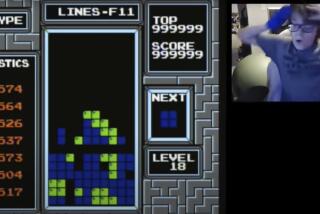The Exterminators
IRVINE — Aaron Lenz fondly remembers the “Macarena Bug.”
After logging hundreds of hours on a computer baseball game called “Grand Slam,” Lenz discovered a major league problem. Whenever there was a runner on first base and a batter hit the ball to the shortstop, the baserunner would just stand and sort of jiggle instead of moving to second base.
“It looked like he was doing the Macarena,” Lenz said with a smile. “It was kind of kooky.”
In pointing out the glitch, Lenz wasn’t being a smart-aleck. He was merely doing his job as one of about 40 computer game testers at Virgin Interactive Entertainment in Irvine.
Usually clad in jeans and T-shirts, Lenz, 22, and his co-workers toil away in a dimly lit room that is mostly silent save for the clicking of computer mouses and control consoles. The group taps away intensely at strategy and sports games. Some spend hours destroying fleet after fleet of enemy submarines. Others are obsessed with smacking home run after home run.
Precise figures are hard to come by, but industry analysts say demand for testers is growing as companies rush to meet a growing demand for computer games. At Virgin Interactive, the game-tester staff has nearly tripled in the last three years. Game testers also are performing a critical role in spotting glitches. In an arena where an estimated 500 companies competed last year for $1 billion in computer game sales, firms can ill afford to release seriously flawed merchandise.
The game-tester jobs at Virgin Interactive and other manufacturers are much in demand. Virgin’s recent classified ad for seven testers drew 200 responses in just two weeks.
“We can be very, very picky about who we hire,” said David Maxey, Virgin’s director of quality assurance. “I’m always receiving resumes and applications even when we have no openings.”
*
Virgin would not say how much it pays testers, but industry analysts say compensation usually starts around $8 an hour. Higher level positions, such as associate producers, can pull down between $35,000 and $45,000 a year.
In addition to the obvious entertainment value, game testers know their coveted position can provide an all-important entree into a business that’s difficult to penetrate. In effect, computer game testing rooms are serving the same purpose as the corporate mail rooms of yesteryear.
“One of the problems with this business is there really isn’t any formal way to get into it,” said Gary Whitta, editor of PC Gamer, a monthly magazine that tracks the PC game industry. “And it’s a good entry-level position.”
Wally Wachi Jr. took a 50% pay cut to become a tester, ditching his job as a Los Angeles Municipal Court supervisor to get inside the game industry. The 28-year-old Gardena resident said he realized it was time for a change after he began playing a flight simulator game until 2 a.m. nearly every night.
“I started looking at where I wanted to be in 10 years,” said Wachi, who like most testers wants to create his own game. “And there was just no question.”
But before Wachi and his colleagues get a shot at their dreams of computer game glory, they have to face the day-to-day reality of being a tester. After a few weeks of 40-plus hours at a mouse pad or control console, the novelty of toying with computers can sometimes wear thin. Because of the grinding monotony, testers usually last about 18 months, say industry analysts. By that time, they either have been promoted or have left.
“People who don’t know the business sometimes view the job like being a beer taster. It seems ideal,” Whitta said. “But often they are told to play a game they don’t like and to play it to death. It can be quite a chore.”
Indeed. At Virgin, testers are loosed on a relentless search for “bugs,” which they then classify into a three-tiered hierarchy of severity. Often, the process means hours of repeating similar computer movements to identify a single problem.
Once a glitch is found, the tester must guide a programmer to the problem so it an be corrected. It’s a process that sometimes requires hundreds of motions. Sometimes, it can take six months to completely test a single game.
“It’s not like we just sit here eight hours a day and just love it,” Lenz said as he tested “Grand Slam,” a baseball game due out in April. “Sometimes it takes five hours just to verify one bug.”
Though there may be monotony, there is also a definite payoff, testers say. The discovery of a programming error makes all the tedium worth it, they say.
Lenz amusingly recalls a game-crashing oddity in a hockey game he put through the paces last year. Every time the player from Spain in the third offensive line scored a goal, the game would lock up.
Most computer mistakes, however, are less dramatic, Lenz explained. For instance, while reviewing “Grand Slam,” testers discovered Anaheim Angel pitcher Chuck Finley was erroneously supplied with two fastballs instead of one, and star Chicago Cub second baseman Ryne Sandberg was playing third base.
“It’s just funny when you can outwit the programmer,” said Lenz, a former video game repairman who attends Cypress College part time. “Sometimes you sit here and think, ‘I can’t believe they didn’t think of that.’ ”
But even after a hard day at the office, Lenz said he needs more game time.
“I don’t leave immediately at 5 p.m. because traffic is so horrible,” said Lenz, whose game of choice is the best-selling strategy game “Red Alert.” “So I usually play two hours of ‘Red Alert’ then I go home and play a couple more hours there too.”
It’s that kind of insatiable appetite for computer games that got Lenz and most of his co-workers hired in the first place, say Virgin officials. Other than possessing a near-addiction for games, Virgin’s testers, who tend to be male and in their early to mid-20s, represent a myriad of personalities.
“Some are quiet and sit in the corner, others are loud and gregarious. But one trait they all have is a ruthless mentality to find bugs,” Maxey said.
Virgin associate producer Mike McCaa discovered his obsession for computer games while touring the country as a stand-up comedian. When he wasn’t on stage peppering audiences with jokes, he was in a hotel room mesmerized by his computer game.
After four years of the comedy grind, McCaa contacted game companies throughout Southern California and finally landed a job as a tester at Virgin. From there, the 36-year-old was promoted through the company ranks. He is proudly awaiting the release of “Grand Slam,” which he helped design.
“I wanted to end up doing essentially what I’m doing now,” he said. “But there’s a sad irony when you love games because when you work creating them you don’t have any time to play them anymore.”
(BEGIN TEXT OF INFOBOX / INFOGRAPHIC)
Bug Busters
Game testers at Virgin Interactive Entertainment in Irvine divide computer glitches, or “bugs,” into three categories based on their severity:
A-Bug: Severe problem causes game to lock up or crash
Examples: International hockey game crashed whenever a certain Spanish player scored a goal. May also involve copyright issues. For instance, if game uses a logo or player name, testers must be certain the company has permission to do so
B-Bug: Moderate problem; doesn’t crash game
Examples: Star second basemen erroneously placed at third base; game camera pans to audience instead of tracking hit baseball; aging hockey player programmed to skate “turtle slow” instead of just slightly slower than teammates
C-Bug: Not necessarily a problem, but tester suggests it would improve game
Examples: Double-checking to ensure player statistics in new baseball game are accurate; suggestion to offer both day and night scenarios in baseball game
*
Source: Virgin Interactive Entertainment






